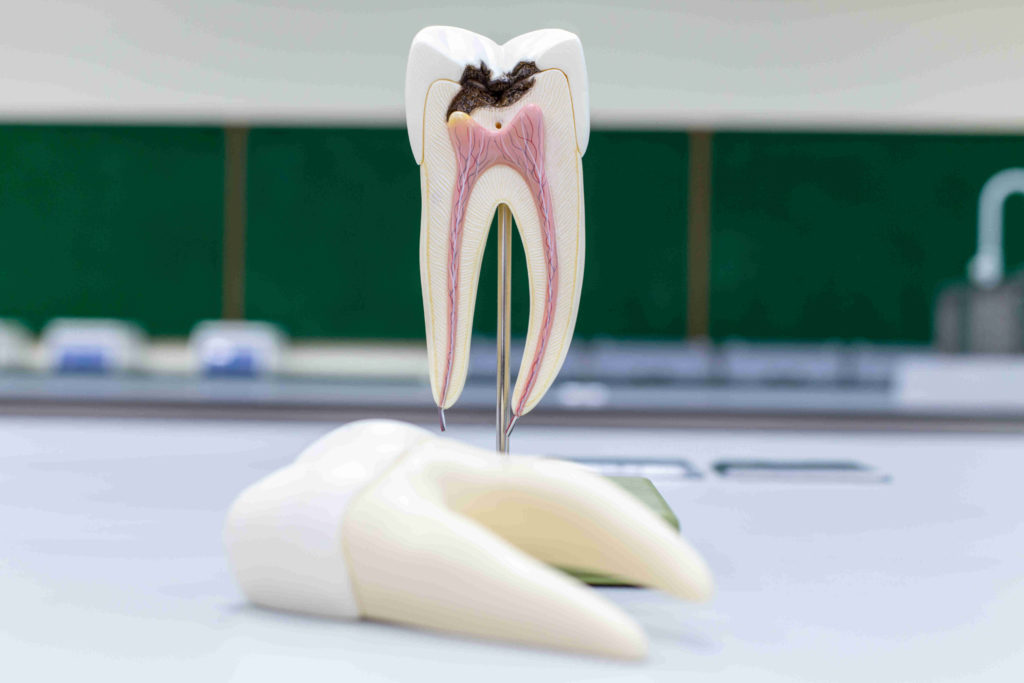You consult your dentist in Lausanne or Fribourg following a dental trauma or a deep cavity. In some cases, it may be necessary to devitalize a tooth. This routine operation involves removing the damaged nerve. The Helvident team explains everything you need to know before having a root canal.
What is root canalization?
This routine dental procedure is carried out by your dentist in Switzerland, or by an endodontist who specializes in this type of treatment. Devitalization is also known as endodontics or root canal treatment. Following trauma such as a blow or injury (broken or cracked tooth), the nerve and pulp may be affected. The same applies to deep tooth decay. The result is the same: an infection develops without necessarily manifesting itself in symptoms at first. On the other hand, some patients notice a change in the color of the tooth, which becomes darker. This reflects the deterioration of the dental nerve. All teeth can be devitalized: incisors, canines, premolars and molars.
Why do you need a root canal?
Infection of the dental pulp can spread to the jawbone through the root canal. Eventually, this can lead to a dental abscess, with an accumulation of pus in the tissues surrounding the tooth. You may experience swollen gums, varying degrees of pain and/or tooth sensitivity. When nerve damage is irreversible, a root canal is required. Otherwise, the infection will spread and the entire tooth will have to be removed. Generally speaking, dentists recommend keeping as many natural teeth as possible.
How does the operation work?
The purpose of root canal therapy is to remove infection from the root canal. The practitioner completely removes the nerve, disinfects the inside of the root and seals it to prevent further infection. The tooth is then consolidated.
This rather lengthy operation is generally performed under local anaesthetic. The patient therefore feels no discomfort. The treated area may be sensitive after treatment, but this sensation fades afterwards. A wide range of painkillers are available to relieve the pain of root canal treatment. Ask your dental surgeon for advice.
In most cases, you'll need to schedule at least two in-patient root canal appointments. The first time, the dentist or endodontist extracts the infected pulp and treats any abscess. He then cleans the root canal and applies a temporary filling. At the next appointment, the oral health professional applies the permanent filling.
What to do after a root canal
In the past, a filled tooth would turn dark after treatment. Fortunately, techniques have been perfected, and discoloration following root canal treatment is rare. In any case, there are several solutions for restoring a tooth's natural appearance.
As far as maintenance is concerned, devitalized teeth require the same cleaning as other teeth. Visit Swiss Society of Dentists SSO recommends brushing at least twice a day with fluoride toothpaste. Good oral health also means flossing, stopping smoking and eating a balanced diet low in sugars.
How does the tooth recover after root canal therapy?
In practical terms, a devitalized tooth is a "dead" tooth. Even if it's healthy, it's still fragile. As a general rule, a simple filling will suffice. However, if necessary, your dentist will place a crown. If the tooth is badly damaged, the dentist will install a root abutment to strengthen the crown's hold.
Even if the tooth is dilapidated, it can be made functional and aesthetically pleasing again thanks to modern adhesive techniques. At the Helvident dental clinics in Lausanne, Fribourg and Aigle, we perform adhesive ceramic restorations (onlays).
Your dental surgeon may also opt for pulp capping. Pulp capping is an alternative to root canalization, which preserves the vitality of the dental pulp, especially in younger patients. Pulp capping involves placing a biomaterial (usually calcium hydroxide) in contact with the pulp. This prevents the passage of food debris and bacteria into the pulp tissue and promotes healing.
In principle, a root canal will solve the problem permanently. In rare cases of re-infection, however, the procedure will have to be repeated. The tooth will then be unblocked, disinfected and filled again.
At HelvidentOur dentists and specialists offer you the most appropriate and conservative treatment possible, depending on the clinical context. To keep your natural teeth looking their best for longer, we recommend regular check-ups to intercept cavities before they reach the devitalization stage. See your dentist at least once a year for a routine check-up.

